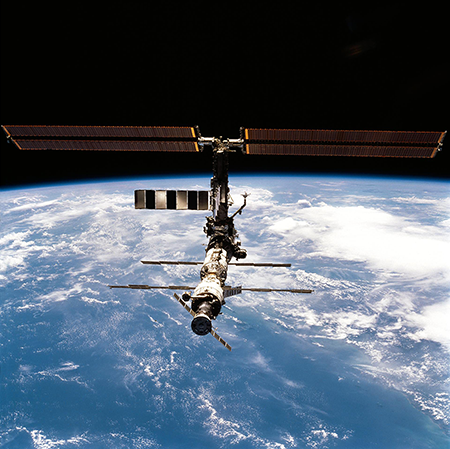UN Reaffirms Outer Space Treaty
December 2024
By Shizuka Kuramitsu
The UN General Assembly, overcoming objections from Russia, reaffirmed the 1967 Outer Space Treaty prohibiting the deployment of weapons of mass destruction in outer space.

The vote on Dec. 2 was 167-4 with 6 abstentions, a gain of 8 votes in favor of the treaty over the tally cast on Nov. 8 by the General Assembly’s First Committee, which handles disarmament and security threat issues. The committee vote was 159-5 with 6 abstentions.
Led by Argentina, Japan, and the United States, the votes culminated an initiative that has been the subject of debate since U.S. intelligence reported on a new Russian space capability in February. (See ACT, March 2024.)
The resolution affirmed the obligation of all states-parties “to fully comply with the Outer Space Treaty, including not to place in orbit around the Earth any objects carrying nuclear weapons or any other kinds of weapons of mass destruction, install such weapons on celestial bodies, or station such weapons in outer space in any other manner.”
It also includes a call for states-parties “not to develop nuclear weapons or any other kinds of weapons of mass destruction specifically designed to be placed in orbit around the Earth, to be installed on celestial bodies, or to be stationed in outer space in any other manner.”
Prior to the final vote in the First Committee and later in the full General Assembly, Russia submitted two amendments that were strongly opposed by the resolution sponsors. One Russian amendment would have expanded the prohibition to include “any other kinds of weapons,” not only weapons of mass destruction, and the other amendment would have called for negotiations on new legally binding agreements that are “reliably verifiable.”
Introducing the two amendments, Russia said in a statement on Nov. 5 that it “has no objection to reaffirming the obligations already contained [in the treaty]…. Nevertheless, it is unacceptable to give the impression that UN member states are prepared to limit themselves to reaffirming already existing international legal norms.”
Russia argued that “it could be interpreted” that the resolution as conceived by the authors was an “attempt to legitimize the placement of any other weapons other than [weapons of mass destruction] in outer space, which would provoke a conventional arms race in outer space.”
In a joint statement on Nov. 7, the resolution sponsors dismissed the Russian amendments as an attempt to materially alter the nature of the draft resolution.
Bruce Turner, U.S. ambassador to the Conference on Disarmament (CD), called the amendments an attempt “to hijack a resolution…[intended] to address a focused topic,” and he urged states to vote against them.
Further, he criticized Russia’s approach to negotiations on the resolution, saying that Russia repeatedly refused to engage on any opportunities for compromise. “This constitutes bad practice and a dangerous precedent,” Turner said.
Both Russian amendments were rejected by the committee. The votes were 41-66 with 49 abstentions for one amendment and 42-65 with 49 abstentions for the other.
Russia failed in trying to advance a similar amendment to a Japanese-U.S. resolution in the UN Security Council in April. (See ACT, May 2024.) Since 2008, Russia and China have been advocating at the CD to ban placement of all weapons in outer space by introducing a draft Treaty on the Prevention of the Placement of Weapons in Outer Space and of the Threat or Use of Force Against Outer Space Objects. These efforts have not drawn widespread international support.
